May 21, 2025 | 03:01 GMT +7
May 21, 2025 | 03:01 GMT +7
Hotline: 0913.378.918
May 21, 2025 | 03:01 GMT +7
Hotline: 0913.378.918
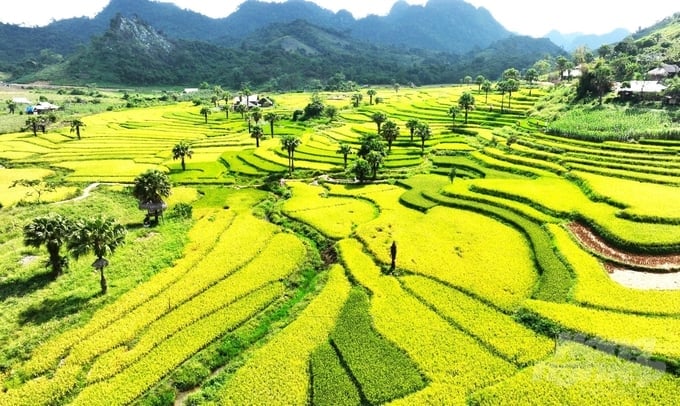
A corner of terraced fields in Ban Ten.
Ban Ten is a rare Mong village in Dong Hy district and Thai Nguyenprovince. The village is located on a mountain more than 1,200m high in Van Lang commune and is the last commune striving to reach the new rural destination in 2024 of Dong Hy district. Ban Ten is still poor. Poverty here exists in every house, from roads, crop productivity and even poverty. The whole village has 148 households, with 147 poor and near-poor households.
Ban Ten Village Deputy, Mr. Ngo Van To crossed some rice fields to welcome us to visit his house. In reality, he must climb a mountain to reach to us. Because the fields in Ban Ten are terraced fields, the edge of the field is also the only road to the To family's village, motorbikes cannot go there. Everything from cassava, corn, vegetables... goes home on the Mong people's backs.
Mr. To told us that, due to the lack of sugar for many years, poverty still remains with the Mong people. Mr. To's family is not the poorest household in the village. Each rice crop yields about 5 quintals of rice and 2 tons of corn. That way, people won't be able to eat all the rice and corn in the harvest and there will be leftovers to feed livestock. But if you want to sell it for money, you won't have anything to eat. Mr. To and his wife also cut trees and worked as hired laborers to earn money to support their three sons. They were at the growing age, so before they could get home, Mr. To and his wife had all the money they could get from working as hired laborers to cover their debts.

Officials of Dong Hy district and people of Ban Ten village visit the crop rice fields. Photo: Dao Thanh.
I jokingly asked: Will Mr. To have another boy child? He smiled and replied: "Including me there are already four boys in this house." Now his and his wife's job is to take care of their three children's education. A guy studying at a boarding school is supported by the State with food and accommodation, so he doesn't have to worry. But there were many days when the older son came home and left without his parents being able to rush out and buy him a bar of soap to take with him, so having three boys like that was very difficult!
Although poor and difficult, Mr. To still decided to let his children learn as much as possible. So that they won't be like him, like their mother (Mr. To's wife is illiterate) with little literacy, it's difficult to do anything, poverty also comes from that.
Helping Ban Ten overcome poverty, many projects have been supported by the State for Mong people. Officers climbed the slopes to Ban Ten many times and became familiar with it. When the steep climb to Ban Ten no longer made the officers feel tired, the project gradually entered the minds of the villagers.
Van Lang Commune Party Committee Secretary, Mr. Hoang Xuan Truong has more than 20 years of experience with this place. From the day the road connecting the center of Hoa Binh commune to the center of Van Lang commune was a muddy and difficult dirt road to now becoming an asphalt road and concrete road to the villages, and there are 4 schools that all meet national standards, along with good medical stations, electricity also reaches the hamlets to serve daily life and production for the people. Having been together for a long time, he knows what the villages and hamlets here lack and need.
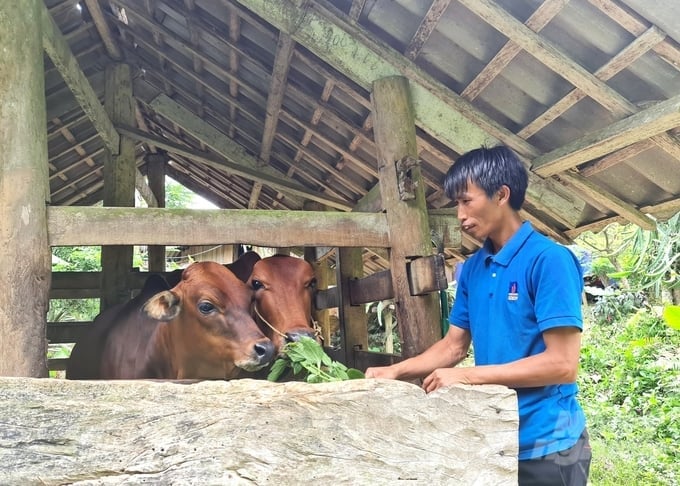
Mr. Ngo Van To takes care of his family's cows. Photo: Dao Thanh.
Mr. Hoang Xuan Truong said that the most difficult thing in Van Lang is that the number of poor household is still high. People mainly make a living by growing upland rice and corn, but arable land is limited and there is a serious lack of water resources. Van Lang commune has more than 6,000 people, and the number of Mong people accounts for 1/3 of the population.
To help local people escape poverty, the State has brought many programs and projects to Van Lang, especially Ban Ten. The State project has come to the village, so how can the project stay? That concern kept lingering in the minds of Van Lang Commune Party Committee Secretary, Mr. Hoang Xuan Truong and the commune authorities. Because when people have not heard, then bringing strange rice varieties to the village will receive a no from the local people because the strange rice variety is not suitable for the Mong their land. It's like, carrying a cross-bred cow will be difficult to take care of, but carrying a local cow will look too small...
If you want the people to listen, you must understand them, you must stay with the people so they know you truly want to build a life with them. That's why once, the Secretary of the Party Committee of Van Lang commune, Mr. Hoang Xuan Truong, on the first day of Tet, he came to people's houses to wish both New Year and mobilize people to donate land to build roads and mobilize people to do business. After the people heard it, the officials happily raised their cups of wine and joined the people in celebrating the new spring.
Since the visits to the village by Secretary Truong and officials of Van Lang commune, peach and plum varieties have grown on the hill gardens and sprouted with the spring sunshine. Cows, hybrid cows and many breeds of pigs and poultry... have stayed in the barn for many days, growing up to give birth to new breeds instead of being hastily slaughtered by people early. In particular, the greatest success is the introduction of new rice varieties that have good drought resistance while still ensuring productivity. Thanks to that, the water-deficient rice fields of previous years have now been replaced by drought-resistant, higher-yielding rice varieties.
October is the most beautiful season in Ban Ten. The terraced fields are turning golden and shiny, with the scent of ripe rice blending in with the smell of the homeland. Ms. Long Thu Hang, the Commune's agricultural and forestry cadastre officer, told us that this year's rice crop was good, with an estimated yield of about 2 quintals/360m2. With this number in the delta or midland fields with abundant water sources, it is not too high. But with Ban Ten, where farming is done only with water from the sky and a few underground streams in the canyon, it is a great success. With this productivity, families will not be afraid of lacking rice during the lean season.
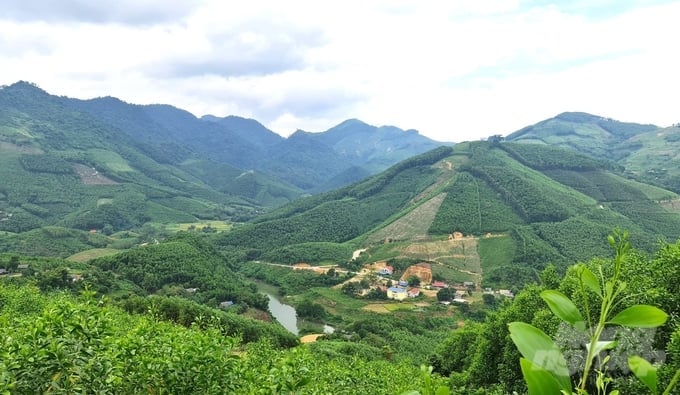
Van Lang commune is trying to reach the new rural destination in 2024. Photo: Dao Thanh.
It took Ms. Nguyen Thi Hang, the Chairwoman of the Board of Directors of V-ginseng Joint Stock Company three years to get the Bo Chinh ginseng tree to take root in Ban Ten. People agreed to grow ginseng with her, also because they loved her so much and saw that her desire was as honest as the desire of a Mong person.
During a survey of ginseng growing land, Ms. Hang found that the rocky mountain soil in Ban Ten has very good natural organic humus and the day-night range of weather here is also suitable for ginseng plants because of hot sunny days but cold at night, suitable for producing ginseng with good medicinal properties. But what made her determined to bring the ginseng plant here was because the people were so poor, she wanted to bring this plant variety to help people escape poverty.
The idea is good, but the implementation is not easy. People don't know that she has good intentions. Every time she went to the house to campaign, the house that saw her from afar quickly closed the door. Households that did not close the door at her, also did not even bother to talk to her. They ignored her and kept talking to each other in Hmong. People were afraid that when they heard that she was growing ginseng, there would be no corn to make men men to eat.
Not to let Bo Chinh ginseng miss its appointment with Ban Ten, every eleven o'clock at noon she drove alone to Ban Ten, and there are even days that she had lunch in the car. She wants to go at that moment because the new people are not busy in the fields. The first people she approached were the progressive young people of the village.
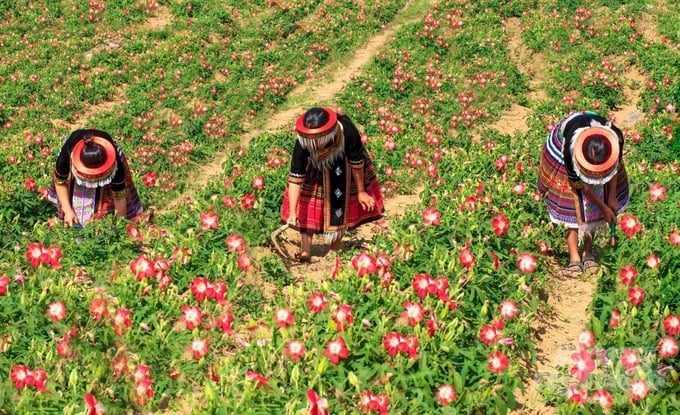
Bo Chinh ginseng fields in Ban Ten promise to help Mong people here escape poverty.
It took a year of going back and forth like that, but by the second year her sincerity had entered the heads of people. Four households agreed to grow ginseng for her, and 3 hectares of Bo Chinh ginseng sprouted and bloomed bright red, covering a rolling mountainous area.
The young couple Ly Van Binh and Vuong Thi Tung were the first people in Ban Ten to be moved by Ms. Hang's enthusiasm. But to listen to her completely, Binh and his wife need to solve the food problem. Because of the lack of arable land and lack of water, she had to spend an entire large valley to grow ginseng for her, afraid that in the coming season there would be no corn to eat. She pledged that if ginseng cultivation was not effective, she would compensate 16 million equal to the entire corn valley. After a few months of planting, the Binh and his wife's Bo Chinh ginseng valley was green and lush. The first batch of flower sellers had earned enough money of 16 million, which took a year of hard work growing corn to earn. Now, Binh and his wife have peace of mind to stick with her with the Bo Chinh ginseng tree.
Ms. Hang shared that when the 3-hectare Bo Chinh ginseng fields are tightly intertwined with the mountains and hills in Ban Ten, it is also the time when she and the villagers love each other like relatives. Now she is Ban Ten's child. Therefore, in the coming time, expanding the area to 6 hectares will certainly be as easy as the way the men in Ban Ten know how to dance the Mong flute dance, and the women in Ban Ten know how to light a stove and cook a pot of men men.
The day we went to Ban Ten, the sound of bulldozers and road rollers was making a loud noise throughout the mountains. The Deputy Head of Ban Ten Village, Mr. Ngo Van To said that the road is being built by the State around the village. The road is up to 3km long, and took nearly a year for excavators and cars as big as houses to be brought from the city to level and transport. To build that road, each family donated a little land, some families even lost an entire acres. Many households voluntarily to give their lands to the State. But there are also families who are still lingering on their acacia fields, their yards... and are not really in agreement.
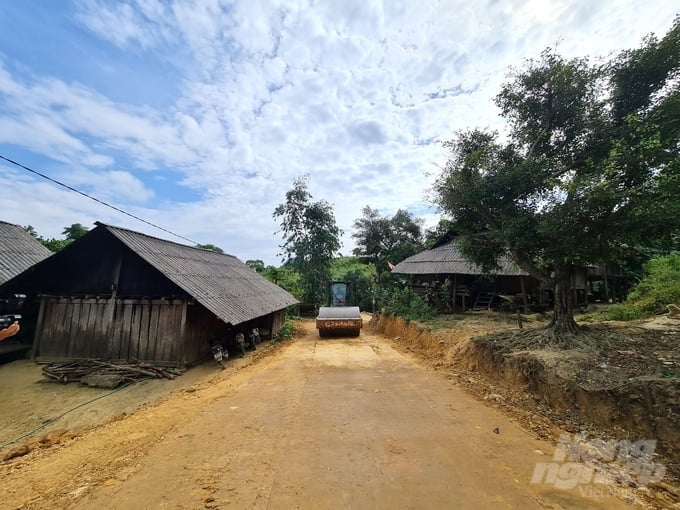
The ring road surrounding Ban Ten is under construction. Photo: Dao Thanh.
For those households who have not decided, commune officials come to their homes to campaign for several days but their heads are still not clear. After the officials returned, Vuong Van Vu's family and Ngo Van Pao's family still hesitated to listen, then the Village Head and Deputy Village Head must came to their house to have a conversation: For several generations, many old people with gray hair have gone, but the poor still stays with the Mong people. Without that path, our children and grandchildren will become old people and still have to live with poverty. As long as those acacia and corn trees remain, the family will enjoy a few seasons. But once the road was opened, the Mong people's descendants in Ban Ten could enjoy it for many generations.
Cups of tea and wine were slowly poured out, and finally the Vu and Pao families also agreed with the request of the Village Head and Deputy Village Head. The Village Deputy Mr. Ngo Van To shared with hope that the new, spacious road, replacing the road with rice fields and rocky slopes, will bring hope to help repel poverty deep into the canyon, opening up the dream of gardens. Eating fruit can be easily consumed, pigs and cows can go to the district town more easily, and that is true happiness.
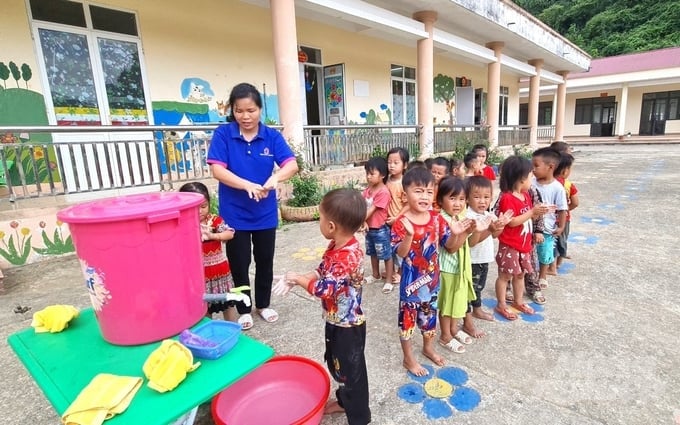
The proportion of Hmong students attending kindergarten is increasing day by day. Photo: Dao Thanh.
Ban Ten is located on a high mountain as if stretching across the sky, beautiful like a cool green plateau. Dong Hy district hopes that after investing in the road, this land will become an eco-tourism destination associated with indigenous culture. Because this place has terraced fields up to 10 hectares wide. In the season when rice is not planted, buckwheat is planted. Ban Ten also has majestic sloping rocks and unique indigenous Mong culture...
The Van Lang commune government has organized several festivals in Ban Ten, attracting many boys and girls from neighboring villages as well as tourists from Thai Nguyen city. Tourists in Hanoi are not afraid of tinnitus and eyestrain when they go through winding mountain roads in order to see the majestic beauty of Ban Ten.
From 2012 to present, Ban Ten has been invested by the State to make about 13km of road from the center of Van Lang commune to the center of Ban Ten village concreted. But there are no roads to the small hamlets. To get home, people have to walk along mountain trails or terraced fields.
In early 2023, Ban Ten continues to invest in building a new concrete road, with a length of more than 2km. The project has a total investment of over VND 11 billion, capital from the National Target Program for socio-economic development of ethnic minority and mountainous areas in 2022, the provincial budget, district budget and other legal capital sources. The expected completion time of the project is in 2024.
Translated by Bao Ngoc

(VAN) In 2024, over 295 million people across 53 countries and territories faced acute hunger—an increase of almost 14 million people compared to 2023, while the number of people facing catastrophic levels of hunger reached a record high.

(VAN) World Environment Day 2025 (June 5) carries the theme 'Beat Plastic Pollution' continuing to emphasize the global urgency of addressing the plastic waste crisis.

(VAN) This was the assessment shared by experts at the workshop titled 'Assessing the Role and Potential of Low-Emission Rice Production Systems in Vietnam,' held on the morning of May 19.

(VAN) Cai Rong Port is the fisheries control center of Quang Ninh, helping to monitor fishing vessels, combat IUU fishing, and remove the EC's 'yellow card'.

(VAN) The German Agricultural Society (DLG) explores the possibility of establishing a mechanization service center in Vietnam’s Mekong Delta to support farmers in accessing and utilizing advanced machinery.

(VAN) On May 16, the Department of Water Resources Management, in collaboration with the Food and Agriculture Organization of the United Nations (FAO), held a signing ceremony for the GEF-8 project document.

(VAN) Food safety, mechanization, vocational training, and market opening are key areas of cooperation expected between the Vietnamese Government and the Federal Republic of Germany.